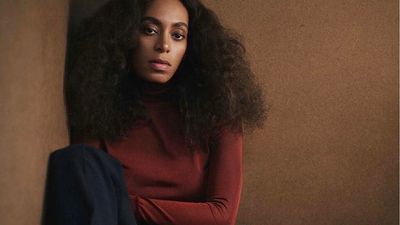4 Ways Solange's Conversation with Beyoncé Has Gems for Days
Beyoncé interviewed Solange about her journey to 'A Seat at the Table.' Need we say more?
Beyoncé should conduct interviews more often.
Solange should continue to drop more gems for us to collect (please?).
The Knowles sisters gifted us with an intimate phone conversation in the midst of their chaotic superstar lives for Interview magazine, where Solange touches on her challenges and accomplishments of her life leading up to the success that is A Seat at the Table.
From touching on how Master P reminds Solange so much of her father, to talking about how real her nerves got leading up to the release, the bond and sisterhood oozes through the interview, where Solange's thoughtful answers and Beyoncé's thoughtful, detailed questions paints a beautiful picture of Solange's process and mind.
Take a look at four of our favorite takeaways below, and have a full read of the interview here.
On listening to her gut:
...I remember being really young and having this voice inside that told me to trust my gut. And my gut has been really, really strong in my life. It's pretty vocal and it leads me. Sometimes I haven't listened, and those times didn't end up very well for me. I think all of our family—you and mom—we're all very intuitive people. A lot of that comes through our mother, her always following her gut, and I think that spoke to me really loudly at a young age and encouraged me to do the same.
On taking complete ownership of her work:
...as far back as I can remember, our mother always taught us to be in control of our voice and our bodies and our work, and she showed us that through her example...And I think it's been an interesting thing to navigate, especially watching you do the same in all aspects of your work: Society labels that a control freak, an obsessive woman, or someone who has an inability to trust her team or to empower other people to do the work, which is completely untrue. There's no way to succeed without having a team and all of the moving parts that help bring it into life. But I do have—and I'm unafraid to say it—a very distinctive, clear vision of how I want to present myself and my body and my voice and my perspective. And who better to really tell that story than yourself?
On why she sings in falsetto on her album:
It was very intentional that I sang as a woman who was very in control, a woman who could have this conversation without yelling and screaming, because I still often feel that when black women try to have these conversations, we are not portrayed as in control, emotionally intact women, capable of having the hard conversations without losing that control. I had not really explored my falsetto as much on previous works... I wanted to find a happy medium, feeling like I was being direct and clear, but also knowing that this was a conversation that I was very much in control of—able to have that moment, to exist in it, to live in it and ponder it, not to yell and scream and fight my way through it—I was doing enough of that in my life, so I wanted to make a clear distinction of me controlling that narrative.
On how real imposter syndrome can be:
One thing that I constantly have to fight against is not feeling arrogant when I say I wrote every lyric on this album. I still have not been able to say that. That's the first time I've actually ever said it, because of the challenges that we go through when we celebrate our work and our achievements.
